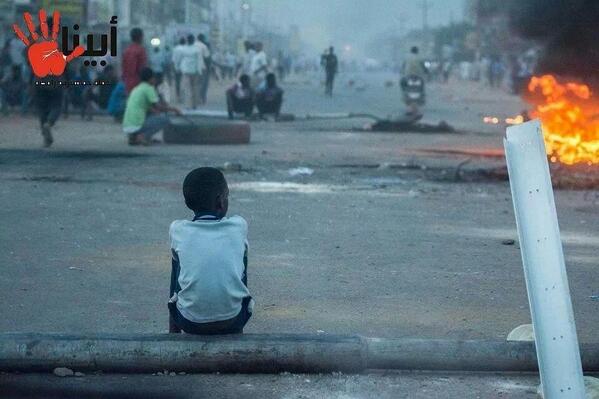
On Twitter, Yasir Yaha shares this photograph of a child watching the mayhem unfold in Sudan. Photo credit: @yasirya7ia
Sudan's answer against fuel subsidy protests, raging for the fourth day in a row, was cutting off the Internet and killing dozens of protestors. Activists say Sudan pulled the Internet plug to stop activists from sharing its crackdown on protestors on the one hand, and screening the rest of the world from seeing the carnage unfolding on the ground.
Girifna, the Sudanese Non-Violent Resistance Movement, posts a round up on developments in Sudan over the previous four days. They say, over the last 24 hours, the Sudanese government cut off the Internet – to stop videos and images of the crackdown on protesters from spreading.
Popular Protests
According to Girifna:
Sudan is experiencing a new wave of popular protests that are increasing in popularity and scope. They have so far included Wad Madani, Khartoum, Kassala, Port Sudan, Gadarif, Sinaar and Nyala. In all of these towns except Nyala, the protests were triggered by the critical economic situation that saw in the last weeks a sharp depreciation of the Sudanese pound vis a vis the dollar and, and an increase in prices of basic food items and the cost of fuel. This was compounded by the government’s announcement, last Tuesday (September 17) that it was lifting State subsidies from fuel and essential food products, such as sugar. Starting Tuesday, September 24, the price of gasoline almost doubled.
The report adds:
What separates this new wave of protests from previous ones is that the protests are not led, coordinated or mobilized by known political factions or youth movements. These protests are more grassroots in their nature and not geographically localized in specific neighbourhoods. In Khartoum, the protests included most areas, with the participation of school students and young adults.
100 Killed in Khartoum
Girifna's estimate of the human toll is as follows:
Reports of deaths of peaceful protesters, mainly by live bullets, indicate that in Khartoum alone about 100 civilians were killed– by the end of the third day of protests. While in Madani the death toll reached 12 civilians by Tuesday. The number of those injured is much higher, but could not be confirmed.
Gas Stations Closed:
Girifna adds:
In Khartoum all gas stations are closed, creating a severe shortage in gasoline and implying that mobility of residents of the capital will be limited if the situation remains the same. Market places and smaller neighbourhood shops have also closed down creating shortages in basic foodstuff. This has implications on the future ability of Khartoum’s residents to communicate as many depend on pre-paid credit for their mobile phones, and may not be able to buy phone credit in the immediate future.
Schools Closed:
And schools were closed:
On Wednesday the Sudanese government announced the closure of all schools until September 30. At the time of writing this report there was unconfirmed news that a curfew may be imposed from 7 p.m. to 6 a.m., most probably in an effort to limit the continuation of protests which went on until after midnight in some areas of the capital on Tuesday and Wednesday.
Shutting Down the Internet:
According to Girifna, the Internet was shut down to stop activists and protesters from sharing news on the ground. Also, the government did not want the world to see what was happening in Sudan.
On Wednesday at about 1.30 p.m. Sudan time, news spread about the possibility of the internet being disconnected as information from mobile phones including video footage and photos that were being shared by protesters on the ground; as well as communication via smart phone applications such as, WhatsApp stopped suddenly. Soon after, wi-fi connections were also impacted. This created panic, because in the current information black-out a lot of citizens are using their phones and applications on smart-phones to share videos, pictures and updates. The only source of information for Sudanese inside Sudan and outside was social media platforms where most information was being exchanged, in addition to telephones and transfer of information via word-of-mouth.
The shutting down of the internet comes at a time when very disturbing images and videos of dead students and injured protesters are starting to circulate on social media. It is proof that the Government of Sudan has something to hide that it does not want its citizens to share with the rest of the world.
Activist's Family Harassed:
Sudanese activist Khalid Ewais complains that his family, back in Khartoum, is being harassed by the authorities [ar]:
جهاز الأمن السوداني يبدأ في التعرض بالمضايقات لأسرتي في السودان، الخرطوم. قضيتكم معي أنا، لا مع أسرتي.وأحملكم مسؤولية سلامتهم #السودان_ينتفض
— خالد عويس (@khalidewais) September 26, 2013
The Sudanese Security Service is harassing my family in Sudan, Khartoum. Your issue is with me, not my family. I hold you responsible for their safety.
In another tweet, he shares a tally of the number of injured treated at Khartoum Hospital:
مصادر طبية تؤكد لنا: وصول 185 مصابا بطلقات نارية إلى مستشفى الخرطوم بحري منذ الأمس و135 إلى مستشفى أم درمان..وعشرات القتلى #السودان_ينتفض
— خالد عويس (@khalidewais) September 26, 2013
According to medical sources: 185 victims have been taken to Khartoum Hospital Bahari since yesterday, all of them with gun shots. Another 135 victims taken to Omdurman … and tens of deaths
Meanwhile, the Sudanese are calling on people not to turn a blind eye to their strife:
@rrakia tweets:
If media attempts to ignore #SudanRevolts, twitter needs to make it so that they can't.
— [rey-vuhn] (@rrrakia) September 25, 2013
And blogger Usamah Mohamed expects more Internet cuts:
Networks briefly are back. Expected to be taken down again as ongoing protests continue. #Sudan
— Usamah Mohamed أسامة (@simsimt) September 25, 2013







2 comments